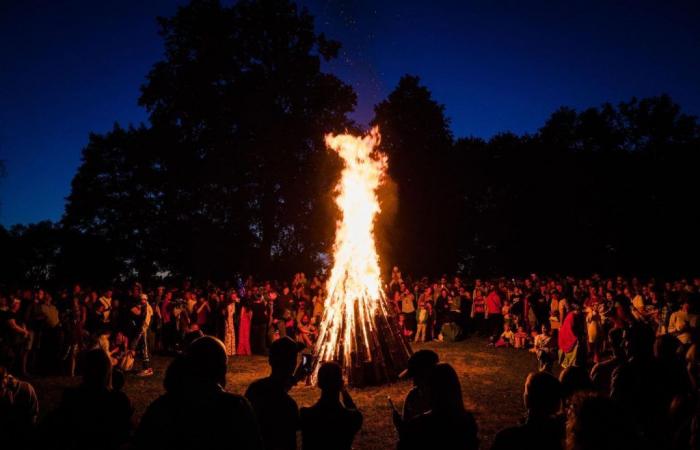► What does the Church celebrate on June 24?
June 24, in the Roman calendar, is the feast of the nativity of John the Baptist, elevated to the rank of solemnity since the last liturgical reform. Saints are usually celebrated on the date of their death, their “birth in heaven”. Son of Elizabeth, Mary’s cousin, and Zechariah, John the Baptist is the last prophet, the one who prepares the coming of Christ. He who is also celebrated on August 29 in the liturgical calendar, the day on which the Church remembers its “takeoff”his martyrdom on the orders of King Herod Antipas, was granted preferential treatment shared only by Jesus (December 25, Christmas), and Mary (September 8, Nativity of the Virgin).
“The Church considers the birth of John the Baptist as particularly sacred: we do not find any of the saints who preceded us whose birth we solemnly celebrated, declared in the 4th century Saint Augustine, of whom we have preserved 11 sermons dedicated to the birth of Saint John the Baptist. We only celebrate that of John and that of Christ. It cannot be without reason. » According to Spirituality Dictionary (1), the public cult of Saint John the Baptist is attested from the 4th century, Augustine being, in his sermons, the witness of an already ancient practice in the West. “We received this custom from our fathers and we transmit it to our descendants, who must observe it themselves with religious piety”declares the Bishop of Hippo.
John’s life, like that of Mary, only takes on meaning in direct relation to Jesus: she is his mother, while his mission is to prepare her coming, that of the Messiah announced by the prophets and awaited by the people of Israel. “John was born, Christ was also born; John was proclaimed by an angel, Christ also was proclaimed by an angel. Great miracle on one side and on the other! », further explains in his sermon Saint Augustine, comparing the birth of John, to an old and sterile mother, with that of Jesus, to a virgin mother.
► Why is John’s birth celebrated at this time of year?
If John, the last prophet, is called ” precursor “in that he knows Christ before their respective births, at the time of Mary’s visit to Elizabeth, he is not the equal of Jesus. “Christ is more than a man, for he is the God-Man, declares Saint Augustine. Jean is a great man; but to exalt God, this man had to humble himself. » The date chosen to celebrate Jean’s birth is therefore not due to chance. On June 24, shortly after the summer solstice, the days begin to shorten, echoing the words of the Baptist speaking of Christ: “It must increase and I must decrease” (Jean, 3,30).
« Jean was a torch; he feared dying from the breath of pride, Augustin still declares. Yes, it was necessary for every man, and therefore John himself, to humble himself before Christ; it was also necessary for Christ, for the Man-God to be exalted: this is what the birth day and the type of death of Jesus and John recall. Today Saint John was born: from today onwards the days become shorter. It was on the eighth of the calends of January that Christ was born: from this day onwards the days grew. »
The 8th of the calends of January, of which Augustine speaks, corresponds to December 25, the date from which the days begin to lengthen. During the time of the Bishop of Hippo, the date of Christ’s birth had already been set on this day. According to Spirituality Dictionary« from the 4th century, the chronological link between the birth of Christ, already fixed on December 25, and that of his precursor, six months his senior according to Luke, had already imposed on the entire West the date of June 24 for this celebration. »
► Where did the tradition of making fires for Saint-Jean-Baptiste Day come from?
Fires on the occasion of the summer solstice historically precede Christianity. It was a pagan festival celebrated in particular by the Celts and Romans to bless the harvest, celebrate the longest day of the year and give victory to the light of fire over the darkness of the night.
This festival was later Christianized and is today celebrated across the world a few days before the summer solstice with large bonfires. In Bagnères-de-Luchon (Haute-Garonne), the “brandon of Saint-Jean”, a tradition consisting of igniting a barked fir tree about ten meters high at the time of the summer solstice, was even included on the list of intangible cultural heritage of humanity in 2015. In the rituals present in a certain number of French regions, we find the fact of keeping the ashes of the Midsummer fires, supposed to protect the crops from lightning and storms. Lovers were also invited to jump over the fire to guarantee year-round love. But Midsummer fires also exist in many countries around the world. In Tyrol, the mountains burst into flames each time summer arrives. In Quebec, where Saint-Jean is a national holiday, bonfires also continue, accompanying shows, concerts and fireworks.
In a column published in The cross (2), the writer Christiane Rancé remembered these “Night of Fire”these nights of fire experienced in his childhood in Catalonia. “The fires symbolize the struggle of Good and Evil, from which Good emerges triumphant, she wrote. That it is also a question of the summer solstice, why should we be surprised? This is the reason why this date – six months before the Christmas solstice – was chosen as that of the birth of the Baptist, the only saint to be celebrated on the day of his nativity with the Virgin Mary. Fires, to recall his announcement: Jesus came to baptize us with the Holy Spirit and fire. » For the author, these holidays “which some consider somewhat pagan” are in reality “the expression of a simple, spontaneous and truant liturgy – on the margins, as Saint John the Baptist was, he who stood on the threshold of the Kingdom to come”.
(2) The cross from June 24, 2021.
——–
The extract. “If God is not born in our soul…”
Meditation for the birth of John the Baptistby Master Eckhart (1260-1328) (1), father of Rhineland mysticism.
“Elizabeth’s time was fulfilled, and she gave birth to a son. Jean is his name. And people said: “What will this child be? For the hand of God is upon him.” Is it not written: “The greatest gift is that we are children of God, and that he begets his Son in us.” The soul that wants to be the child of God must not engender anything within itself other than the Son of God himself. God’s noblest desire is to beget; and he cannot be satisfied until he has begotten his Son in us. How would the soul be satisfied with itself if the Son of God is not born in it? It was then that grace flowed forth, poured out by God… So when the time was fulfilled, John, “gift of God”, was born. »
——
What you must remember
June 24, in the Roman calendar, is the feast of the nativity of John the Baptist. Saints are usually celebrated on the date of their death. Son of Elizabeth, Mary’s cousin, and Zechariah, John the Baptist, the last prophet, is granted preferential treatment, shared only by Jesus (December 25, Christmas) and Mary (September 8, nativity of the Virgin).
The date chosen is shortly after the summer solstice, when the days begin to shorten, echoing the words of the Baptist about Christ: “It must increase and I must decrease” (Jean 3, 30).
A tradition is to burn large fires on the occasion of Midsummer. This custom actually precedes Christianity. It was a pagan festival celebrated in particular by the Celts and Romans to bless the harvest, celebrate the longest day of the year and give victory to the light of fire over the darkness of the night.






